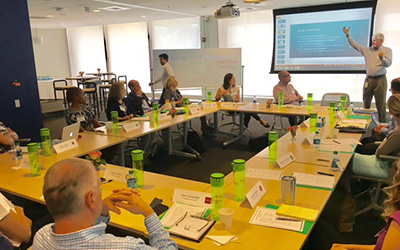A dozen colleges and universities were represented at the 2017 UConn Analytics Roundtable on July 18 at the Graduate Business Learning Center (GBLC) in downtown Hartford.
The goal of the event was to form alliances between career coaches from Northeast business schools with analytics/data science graduate programs.
In addition to UConn, participating universities included: Clark, Syracuse, Merrimack College, NYU, Quinnipiac, Fordham, Brandeis, SUNY Buffalo, Rutgers, Boston University and the University of New Hampshire.
Professor John Wilson from the OPIM department was the keynote speaker and addressed the audience about the trends and future of analytics.

“From the moment guests arrived there was chatter and energy in the room,” said Katherine Duncan, a UConn MSBAPM career adviser, who organized and moderated the event. “It was clear that all invited had passion for helping students and enthusiasm to share.”

